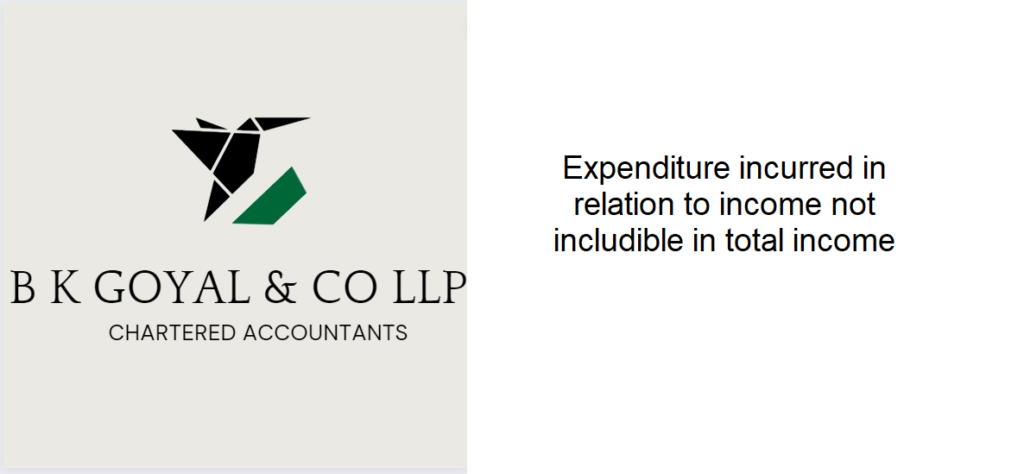The Income Tax Act implemented in 1961 mandates that certain types of income are not to be counted as a part of a taxpayer’s overall income. However, any expenses incurred in connection with such income can be considered for deduction while computing the taxable income. This article aims to discuss the expenses that can be claimed as a deduction with regards to income that is not included in the total income.
Firstly, income earned through agriculture is exempted from income tax under Section 10(1) of the Income Tax Act. Nonetheless, expenses incurred in generating such income can be claimed as a deduction. These expenses may include the cost of seeds, fertilizers, labor, rent for land, repair and maintenance expenses of agricultural machinery, and so on.
Secondly, dividends received from domestic companies are also exempt from income tax under Section 10(34) of the Income Tax Act. However, any expenses incurred in earning such income can be claimed as a deduction. For example, if an individual invests in shares and incurs brokerage fees or other expenses related to the investment, such expenses can be claimed as a deduction.
Thirdly, long-term capital gains from the sale of listed equity shares or units of equity-oriented funds are exempt from income tax under Section 10(38) of the Income Tax Act. Nevertheless, expenses incurred in connection with such gains can be claimed as a deduction. For instance, if an individual incurs expenses on brokerage fees or other expenses related to the sale of shares or units, such expenses can be claimed as a deduction.
Fourthly, the maturity proceeds of a life insurance policy are exempt from income tax under Section 10(10D) of the Income Tax Act. However, any expenses incurred in relation to the policy can be claimed as a deduction. For example, if an individual pays premiums for a life insurance policy, such premiums can be claimed as a deduction.
Lastly, gifts received by an individual are exempt from income tax under Section 56(2)(x) of the Income Tax Act. Nonetheless, any expenses incurred in connection with such gifts can be claimed as a deduction. For instance, if an individual receives a gift of property and incurs expenses on registration fees or other expenses related to the transfer of property, such expenses can be claimed as a deduction.
In conclusion, though certain income types are exempt from income tax, the expenses incurred in connection with such income can be claimed as a deduction. It is crucial to maintain proper records of such expenses to claim the maximum deduction allowed under the Income Tax Act. Seeking advice from a tax expert is advisable to ensure the proper guidance on claiming deductions.
section 14A of Income Tax Act, 1961
(1) 1[Notwithstanding anything to the contrary contained in this Act, for the purposes of] computing the total income under this Chapter, no deduction shall be allowed in respect of expenditure incurred by the assessee in relation to income which does not form part of the total income under this Act.
(2) The Assessing Officer shall determine the amount of expenditure incurred in relation to such income which does not form part of the total income under this Act in accordance with such method as may be prescribed2, if the Assessing Officer, having regard to the accounts of the assessee, is not satisfied with the correctness of the claim of the assessee in respect of such expenditure in relation to income which does not form part of the total income under this Act.
(3) The provisions of sub-section (2) shall also apply in relation to a case where an assessee claims that no expenditure has been incurred by him in relation to income which does not form part of the total income under this Act :
Provided that nothing contained in this section shall empower the Assessing Officer either to reassess under section 147 or pass an order enhancing the assessment or reducing a refund already made or otherwise increasing the liability of the assessee under section 154, for any assessment year beginning on or before the 1st day of April, 2001.
Services of B K Goyal & Co LLP
Income Tax Return Filing | Income Tax Appeal | Income Tax Notice | GST Registration | GST Return Filing | FSSAI Registration | Company Registration | Company Audit | Company Annual Compliance | Income Tax Audit | Nidhi Company Registration| LLP Registration | Accounting in India | NGO Registration | NGO Audit | ESG | BRSR | Private Security Agency | Udyam Registration | Trademark Registration | Copyright Registration | Patent Registration | Import Export Code | Forensic Accounting and Fraud Detection | Section 8 Company | Foreign Company | 80G and 12A Certificate | FCRA Registration |DGGI Cases | Scrutiny Cases | Income Escapement Cases | Search & Seizure | CIT Appeal | ITAT Appeal | Auditors | Internal Audit | Financial Audit | Process Audit | IEC Code | CA Certification | Income Tax Penalty Notice u/s 271(1)(c) | Income Tax Notice u/s 142(1) | Income Tax Notice u/s 144 |Income Tax Notice u/s 148 | Income Tax Demand Notice
